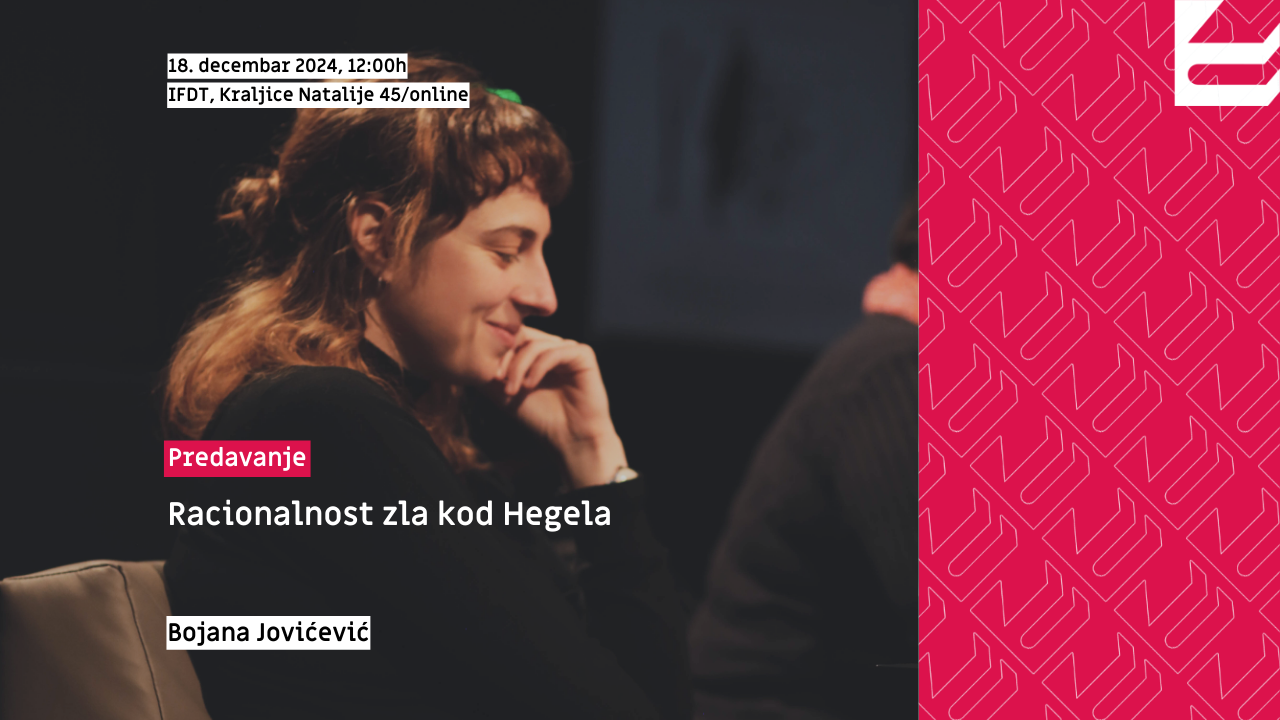
[Lecture] Bojana Jovićević – Hegel on The Rationality of Evil (CriticLab)
In this talk, I will consider the idea of evil in Hegel’s philosophy. In The Science of Logic, Hegel characterizes evil as “external contingency” (GW 11, 241 / Hegel 2010a, 337), referring to unfavorable circumstances that violate or even abolish the principle of the good. For example, I may want to help a friend, but a pressing deadline prevents me from doing so. Or, no unfavorable circumstance obtain, but my judgment of what is the right thing to do is impaired, and instead of helping my friend, I end up harming him.
However, if evil is understood as the negation or subtraction of the good (to use Aristotle’s formulation), it lacks a logical principle of its own. Since evil is explained by the same principle that accounts for good – albeit negatively – it can only be a form of logical privation. At best, we might speak of “badness,” but not evil, in any substantial sense of the term.
Contrary to the view of evil as a mere privation of the good – whether in the form of unfavorable circumstances or a suspension of moral judgment – I argue that: (1) for Hegel, evil is a full-fledged ontological principle; and (2) it is embodied in the individual, being what is, in fact, most proper to her. It is not that the individual is inherently doomed to evil (as Kant might suggest), but rather, evil constitutes the individual’s singularity. Böse zu sein, heißt einzeln zu sein (GW 12, 50-51).
Yet, if evil, as Hegel insists, is a means of expressing one’s individuality in a fully rational manner – indeed, “the right of the individual” to actualize her own free will (GW 7, 58) – how, then, can such an individual form social bonds with others? In other words, does Hegel’s insistence on evil – as an ineliminable and even constitutive element of what it means to be a finite, rational being – not bring him conceptually close to voluntarism, suggesting an inherently unstable social order of rational finite beings, shot through with unpredictability, injustice, and chaos?
Bojana Jovićević is a Research Assistant at the University of Ljubljana. She has recently completed her PhD thesis on Hegel’s concept of free release (frei entlassen) in Hegel’s Science of Logic at the Department of Philosophy, University of Ljubljana. In 2018/19, she was a DAAD scholarship holder at FAGI, University of Leipzig. Her main research interests include German Idealism (Hegel, Fichte, Kant), metaphysics, ethics, and feminism. She also works as a translator of philosophical works, most recently translating F. H. Jacobi’s Concerning the Doctrine of Spinoza in Letters to Moses Mendelssohn.
Currently, she is a postdoctoral researcher at the University of Chieti (Italy), where she is working on a project entitled Hegelian Constellations of the Feminine: A Hyperarchive for an Inclusive Bildung. She is also a postdoctoral researcher in Ljubljana, working on the project The Common between Substance and Subject: A Hegelian Proposal for a New Social Ontology. Her most recent publications include the article “The Rationality of Evil” in The Idea of Good (University of Ljubljana Press, 2024), as well as “Hegel und Feminismus – zur philosophischen Relevanz” (co-authored with Karen Koch, Vittorio Klostermann Verlag). She is also a co-editor of the volume Hegel and Feminism, with Giulia Bernard and Karen Koch (forthcoming, Bloomsbury, March 2025).
